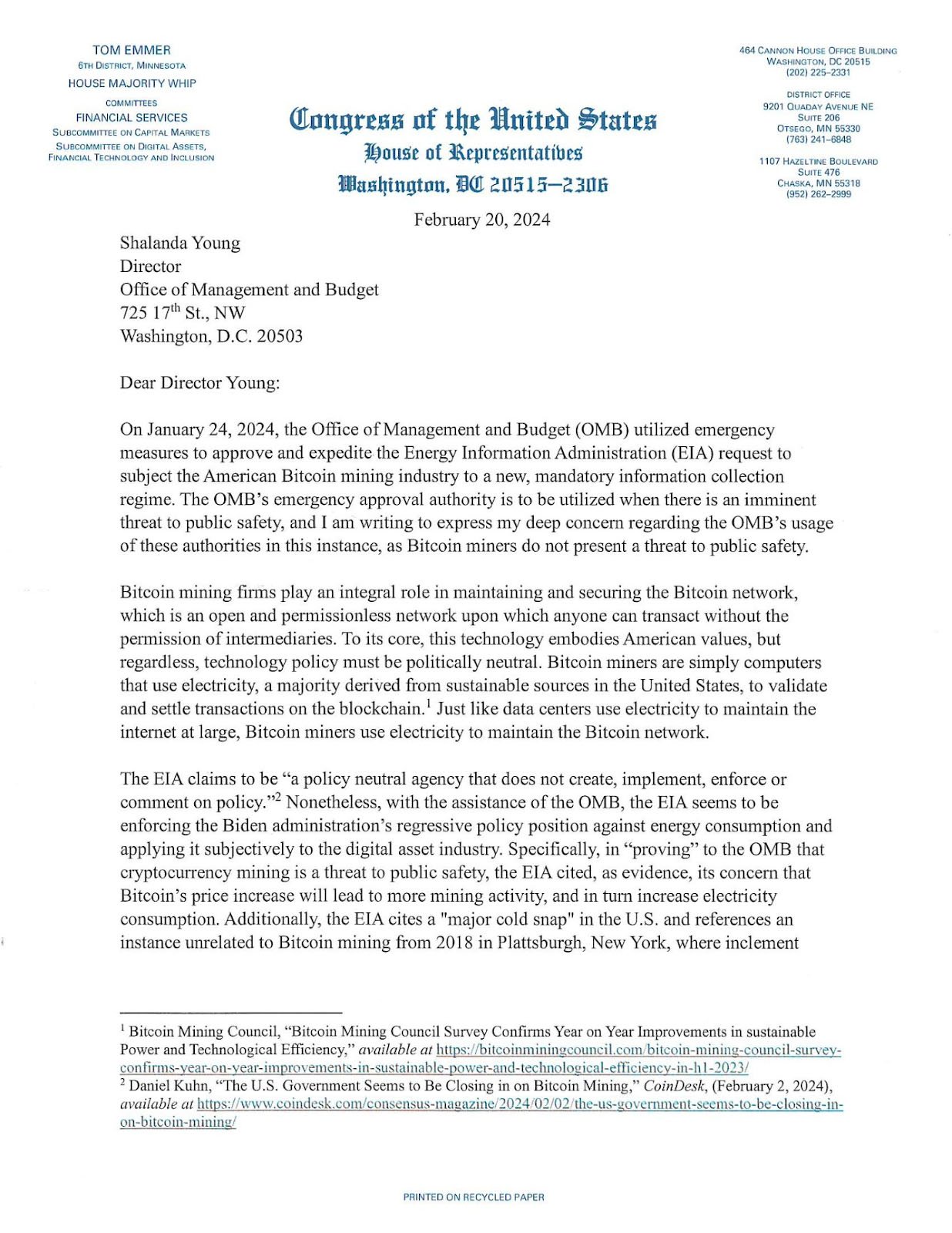The House Majority Whip, Tom Emmer, has taken a stance against the approval of an emergency request aiming to collect data from bitcoin mining operations within the United States. He expressed his concerns in a letter to the Office of Management and Budget (OMB), stating that bitcoin miners do not pose a threat to public safety. He states:
“The OMB’s emergency approval authority is to be utilized when there is an imminent threat to public safety, and I am writing to express my deep concern regarding the OMB’s usage of these authorities in this instance, as bitcoin miners do not present a threat to public safety.”
Tom Emmer Questions The Emergency Request
The emergency request, greenlighted by the Office of Management and Budget (OMB), permits the Energy Information Administration (EIA) to conduct a mandatory survey on the location and energy consumption patterns of bitcoin mining companies across the nation.
The EIA estimates that in 2023, bitcoin mining consumed between 0.2% and 0.9% of global electricity demand, with the U.S. representing between 0.6% and 2.3%. It has identified 137 bitcoin mining facilities across 21 states, with Texas, Georgia, and New York having the highest concentrations. Facilities contacted by the agency are mandated to provide details about their energy usage. Notably, the EIA plans to begin data collection immediately, with preliminary results expected by mid-year.
Moreover, if a bitcoin miner does not comply with the request for information, they will face criminal charges and civil penalties, including fines of up to $10,000.
Mining’s Ability to Curtail Load
Emmer highlighted the filing’s lack of acknowledgment regarding Bitcoin mining’s ability to cut down the load during peak hours or inclement weather.

He has called upon the OMB to clarify the decision to opt for emergency authorization over normal clearance procedures. During an interview with Fox Business, Emmer stated:
“Forcing bitcoin miners to share proprietary information or else they’ll face criminal penalties is problematic on its own, but the decision to evade normal clearance procedures for this kind of ‘experimental and provisional’ ploy is completely unacceptable.”
Texas Blockchain Council and Riot Platforms Sue EIA
In a related development, the Texas Blockchain Council (TBC) and Bitcoin miner Riot Platforms have taken legal action against the EIA. In a February 22 filing in the United States District Court for the Western District of Texas, the two accused the agency of unlawfully demanding data from the bitcoin mining sector.
The TBC, a non-profit association, expressed concerns about the sensitivity of the information requested, including details about the types of machines used and the locations of mining operations. The council fears that this data could be made public, potentially exposing the industry to further scrutiny. TBC characterized the EIA’s actions as a “direct assault on private businesses under the guise of an emergency.”
It is important to note that the Rocky Mountain Institute estimates global Bitcoin mining electricity consumption at around 127 terawatt-hours annually, surpassing consumption of some countries. However, compared to the banking industry, Bitcoin’s energy usage is significantly lower, estimated at just 1/56th.
Moreover, in November, the former president of the Electric Reliability Council of Texas (ERCOT), Brad Jones, stated in a report that bitcoin mining helps in clean energy efforts and stabilizes grids.
The ongoing dispute between regulators, lawmakers, and industry participants has left the bitcoin community wondering about the future of regulating the energy-intensive bitcoin mining sector.










